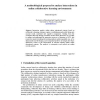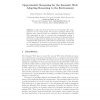893 search results - page 43 / 179 » Environment Assumptions for Synthesis |
CVPR
2004
IEEE
13 years 11 months ago
2004
IEEE
Tracking of humans in dynamic scenes has been an important topic of research. Most techniques, however, are limited to situations where humans appear isolated and occlusion is sma...
WWW
2004
ACM
14 years 8 months ago
2004
ACM
Peer-to-peer (P2P) networks use the fundamental assumption that the nodes in the network will cooperate and will not cheat. In the absence of any common goals shared by the nodes ...
ECTEL
2007
Springer
14 years 1 months ago
2007
Springer
Interaction analysis within online educational contexts based on collaborative learning strategies requires a multidimensional model taking into account social, emotional and cogni...
SEMWEB
2007
Springer
14 years 1 months ago
2007
Springer
Despite the efforts devoted so far, the Semantic Web vision appears to be an eluding target. We propose a paradigm shift for the Semantic Web centred around the pragmatics of deve...
WDAG
1993
Springer
13 years 11 months ago
1993
Springer
Fairness is an important concept in design and implementation of distributed systems. At the specification level, fairness usually serves as an assumption for proving liveness. At ...



